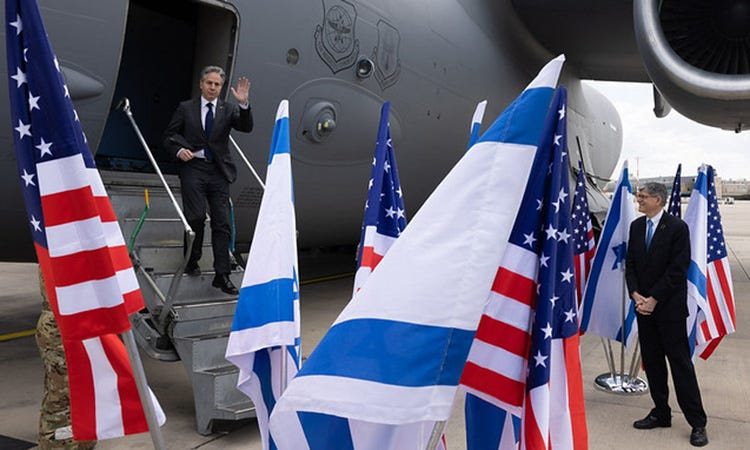Bulletin From the Borderlands Special Report
Two Perspectives on the Conflict in the Middle East
Note from Lethal Minds:
Bulletin From The Borderlands is a joint project between Lethal Minds and some of the most talented OSINT analysts and independent journalists working today. Our goal is to provide you with a clear, accurate, and informative view of the world, free from censorship or bias. The Bulletin will bring you the facts, our analysis, and our evidence. We hope you find our work helps you better understand the complicated and increasingly volatile world in which we live.
Be informed, be prepared, be lethal.
The Author(s):
The Defense Bulletin: Defense Bulletin is run by John M Larrier. As a civilian, I’ve closely followed strategic developments for close to a decade, but “launched” the Bulletin during the pullout in Afghanistan due to the extreme nature of the misinformation I saw my peers as well as others reading into. The lacuna that the general populace has about these now very prevalent subjects is the stated goal for Defense Bulletin.
Zach Busch: A writer and filmmaker based in New York. After graduating from Georgetown University with a BS in International Law & Politics, Zach spent four years working in strategic communications & public diplomacy, specializing in the Middle East, North Africa, and Western Asia. He has advised foreign governments and ghostwritten on behalf of ambassadors and world leaders. He is currently completing his MFA degree in Film Directing at NYU Tisch School of the Arts. Zach's thesis film, Sagittaria, a political succession drama set in an alternate timeline, shoots in September 2024.
Sponsors
The Bulletin is brought you to by PB Abbate.
As you likely know, Lethal Minds Journal shares common ancestry with Patrol Base Abbate, one of the most impactful veteran’s outreach organizations in America. One of the ways in which we connect is through a love of the written word, a belief in the power of good writing to help give a voice to people who need to be heard, and a desire to help service members and vets connect through self-expression.
Two Perspectives on the Conflict in the Middle East
Analyses by Zach Busch, Eric Sheppler, and John M. Larrier
U.S. Seeks to Prevent Outbreak of Regional War in Middle East
John M. Larrier (Defense Bulletin) and Eric Sheppler
Since the targeted killing of Hamas leader Ismail Haniyeh in Tehran, anticipation for the inevitable Iranian retaliation has been building. The high-profile killing of Haniyeh in the Iranian capital, on the same day he met with the Iranian leadership and attended the inauguration of the new Iranian President, Masoud Pezeshkian, is an action that most analysts believe Iran must respond to. The United States, seeking to prevent the further expansion of an already growing regional conflict, has actively engaged in a number of diplomatic efforts to de-escalate tensions in the region. Similar to the last time the U.S. attempted to prevent Iran from conducting large-scale retaliatory strikes against Israel, U.S. decision-makers have attempted to do so using three main avenues of approach: bringing ceasefire negotiations to a close in regards to the Israel-Hamas war, directly exhorting Iran not to escalate, and surging a significant amount of military assets to the region.
In the days after the strike, U.S. President Joe Biden openly stated that the targeted killing of Haniyeh “doesn't help” the ceasefire talks. The extent to which the targeted killing has hampered the talks has become increasingly evident, as Hamas is now reluctant to even come to the table. While the U.S. has been actively involved in the ongoing ceasefire negotiations, much of the current rhetoric surrounding the talks has been heard before. Decision-makers from multiple countries involved in the negotiations continue to characterize the talks as nearly completed. As recently as today, both NSC CSC John Kirby and the U.S. State Department Deputy Spokesperson Vedant Patel said that the “broader framework of what the president [U.S. President Joe Biden] laid out at the end of May has generally been accepted." Most notably, Qatari officials reportedly spoke to Iranian decision-makers and urged them to hold off on the expected large-scale retaliatory strikes, citing significant progress in the ceasefire talks.
In response to the heightened tensions, the U.S. has also surged a significant amount of additional large surface combatants and ground-based aircraft to the Middle East. The increased force posture in the Central Command (CENTCOM) area of responsibility will hopefully serve to mitigate the threat of large-scale strikes against Israel by Iran and IRI-aligned non-state actors in the region.
Key Judgment 1
Given Hamas’ rejection of the very same framework multiple times in the past, including the most recent proposal, and Iranian leadership’s apparent need to respond to the targeted killing inside their borders, the likelihood of a ceasefire before Iran’s retaliatory strikes are carried out remains low. The caveat; Iran may not carry out the strikes, but it still remains highly unlikely that a ceasefire will be agreed upon within a reasonable time period.
Key Judgment 2
I wrote an assessment this past May, titled Iran’s New Strategic Outlook: Non-State Actors from Iran’s Perspective. In it, I made two key judgments.
“Hezbollah’s limited response to repeated losses of senior leadership and decision-makers, likely indicates that Iran has not pushed the group to use their significant stockpiles and manpower, to by proxy, step up the escalation ladder.”
“Iran’s increasing willingness to engage in conventional diplomacy and state-to-state cooperation with nations like Venezuela, Turkey, Saudi Arabia (who remains a regional rival), China and others clearly indicates their prioritization of the strategy in recent years, but not entirely over their cooperation with non-state actors.”
Last time Iran conducted large-scale drone and missile strikes against Israel, they conducted a number of diplomatic tours to bolster support for their impending actions with sympathetic partner nations and IRI-aligned non-state groups. We now see Iran conducting a similar type of whirlwind diplomacy, leveraging state-to-state partnerships to dominate the information and diplomatic war raging alongside the kinetic one. Due to these similar diplomatic practices and the relative restraint Hezbollah has shown since the killing of their key decision-maker as well, it’s highly likely that the aforementioned judgments remain true.
Keep reading with a 7-day free trial
Subscribe to Lethal Minds to keep reading this post and get 7 days of free access to the full post archives.







